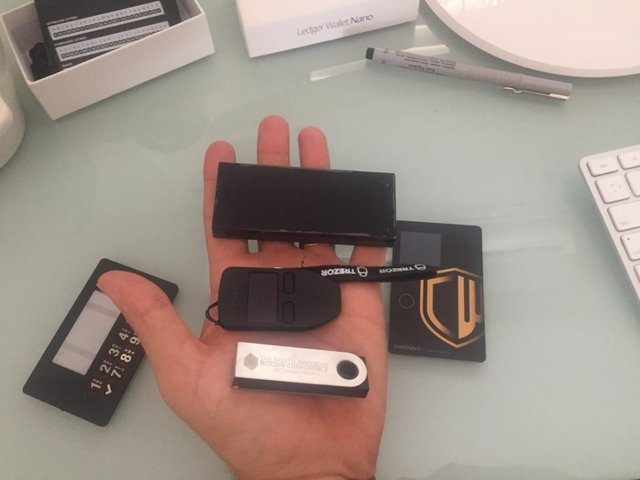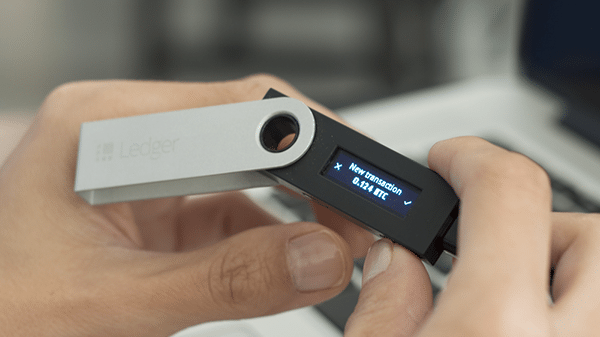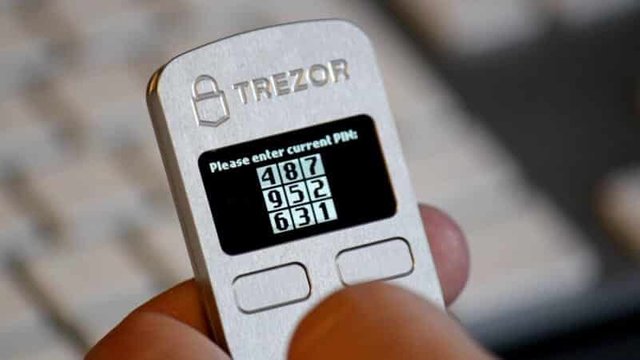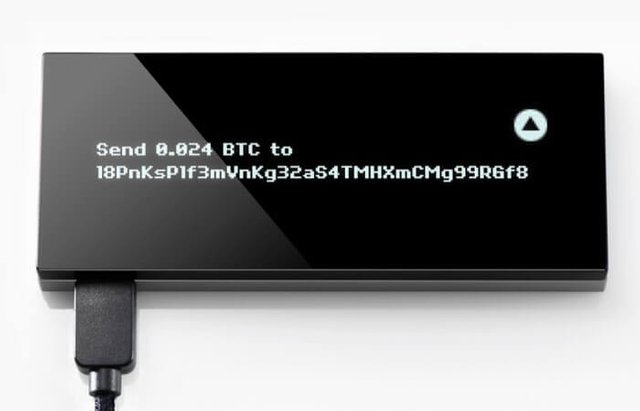For those of you who still haven’t watched out Bitcoin Whiteboard Tuesday’s episode on Bitcoin wallets I suggest you do so before reading any further. For those of you who have, by now you probably know that the most secure way you can store your Bitcoins is through the use of hardware wallets.
Hardware wallets use Two factor authentication. The process of verifying a user's identity by two different methods. Mostly asking a user to present something he has and something he knows. This makes hacking a 2FA secured account much harder. For example, when you withdraw money from an ATM machine you present something you have (the credit card) and something you know (the PIN code). 2FA by making sure that in order to access a wallet you prove your identity by something you have (the physical wallet) and something you know (the PIN code for the wallet). If you’re serious about Bitcoin, you need to get a hardware wallet, I personally have 3 different ones.
Today I wanted to take the opportunity to list who I think are the best Bitcoin hardware wallets on the market for 2017. Keep in mind that the top 3 Bitcoin hardware wallets I will present are all great products. The difference between 1st, 2nd and 3rd place is somewhat minor as you’ll see soon enough.
#1 – Ledger Nano S Bitcoin hardware wallet
I’ve reviewed the Ledger Nano S not long ago and was absolutely impressed. The company, that used to be the second runner up in the Bitcoin hardware wallet race seemed to have matched it’s main opponent TREZOR.
The Nano S has a sleek design, intuitive user interface, a wide support of altcoins (Ethereum, Litecoin, Dogecoin, Zcash, Dash, Stratis) and most importantly an attractive price tag. At the moment the Nano S sells for €79 which is around $99 making it the most affordable hardware wallet from the top 3 as well.
The company (LedgerWallet) has been around long enough to gain a respectful reputation and in all honesty I couldn’t find anything bad to say about their product. Even though I tested this product personally, at the moment I’m still actually using a TREZOR. The main reason for this is because when I started out with Bitcoin the Ledger Nano S wasn’t around yet :)
Click here to learn more about the Ledger Nano S
#2 – TREZOR Bitcoin hardware wallet
My personal hardware wallet is a TREZOR. This is the oldest hardware wallet on the market and probably the most reputable one as well. TREZOR has a nice design, a very easy to understand user interface, and it supports Zcash, Dash and Ethereum aside from Bitcoin (ETH is supported through an external wallet called MyEtherWallet).
The price on the TREZOR is a bit higher and is currently $110. I can’t say it justifies a higher price than the Nano S and therefor it’s in 2nd place in my opinion. However, as I’ve mentioned before, this is a great wallet and you can also read my full review of it here.
Finally, the main advantage TREZOR has over its competitors is the company reputation. One of the company’s founders is Marek “Slush” Palatinus, who also created the first Miners that have grouped together in order to mine more efficiently with their mining power combined. After they successfully mine a block they split the reward between them. mining pool for Bitcoin (founded in 2010).
Click here to learn more about TREZOR
#3 – KeepKey Bitcoin hardware wallet
Coming in 3rd place we have Keepkey, a Bitcoin hardware wallet with a beautiful though somewhat large design. Keepkey has similar features to TREZOR and the Ledger Nano S, however there are a few reasons that make it a bit less attractive in my opinion.
First, the wallet is too big for carrying in your pocket conveniently. The size of the Keepkey wallet is almost twice of the TREZOR or Ledger Nano S (as can be seen in the image above). Second, the company hasn’t built enough reputation in the community.
Additional things that make me hesitate regarding buying the product are:
- I have written to their support several times but haven’t gotten a response yet
- Their support page SSL certificate seems invalid (see here)
- Some bad reviews from the past few month on Amazon seem to question the products reliability
On the bright side, Keepkey supports a wide variety of altcoins including Bitcoin, Litecoin, Dogecoin, Namecoin, Testnet, Ethereum, and Dash. Keepkey currently sales for $129.
Click here to learn more about Keepkey
Additional Bitcoin hardware wallets on the market
Throughout the last 2 years I’ve also explored some additional Bitcoin hardware wallets that didn’t make the top 3 list so I’d like to mention them here.
CoolWallet is a credit card looking hardware wallet that you can carry around in your pocket. My review of Coolwallet was positive, however the wallet hasn’t gained enough marketshare in order for me to consider it a stable product.
BitLox is another hardware wallet I reviewed, however it was in early stages and I couldn’t get it to work properly. I haven’t taken another look at the product since then (this was back in the beginning of 2016) and the product may have become more user friendly.
Conclusion – If you’re serious about crypto, get a hardware wallet
It doesn’t get any simpler than this headline. Yes, hardware wallets cost money and no one like spending money on things they can get for free. But the amount of security you get by using a hardware wallet is much more valuable than the $50-$100 you’ll pay for purchasing the actual device.
Don’t say “it won’t happen to me” because once cryptocurrency becomes mainstream (and it seems like we’re getting there pretty fast) there will be many more cases of hacking or theft. Make sure you’re prepared…




Hi! I am a robot. I just upvoted you! I found similar content that readers might be interested in:
https://99bitcoins.com/winners2017-best-bitcoin-hardware-wallet/
Downvoting a post can decrease pending rewards and make it less visible. Common reasons:
Submit